In bustling city squares, serene parks, and even on quiet residential balconies, you might spot individuals engaged in a seemingly simple yet enchanting activity: feeding pigeons and other birds. This act, often dismissed as mundane by some, holds a captivating allure for many.
So, why do some people feed pigeons and other birds? The reasons behind this charming practice are as varied as the birds themselves. For some, it’s a nostalgic connection to nature’s beauty amidst urban chaos, while for others, it’s a heartfelt gesture of kindness.
This article delves into the multifaceted motivations that drive people to share their space and sustenance with their feathered friends.
From the soothing rhythms of bird interactions to the desire to support avian populations in changing environments, we explore the intriguing factors that make the act of feeding pigeons and other birds a cherished activity for numerous individuals around the world.
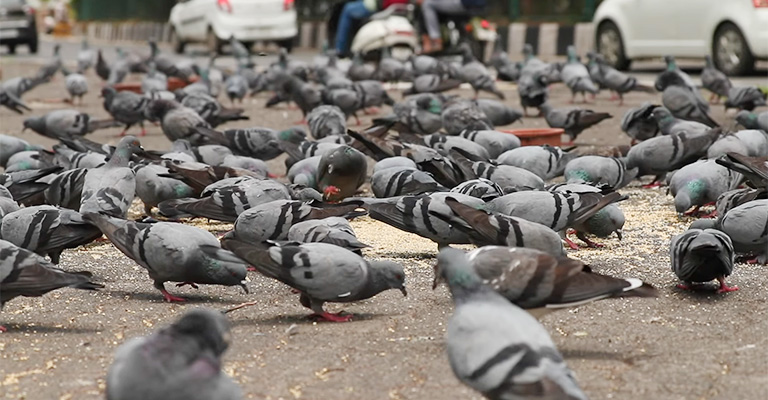
Why Do Some People Feed Pigeons and Other Birds?
Feeding pigeons and other birds is a practice that holds a unique charm for many people. From bustling city squares to tranquil gardens, this activity is often met with curiosity and varying degrees of fascination.
The motivations behind this seemingly simple act are as diverse as the birds themselves, encompassing a range of reasons that resonate with individuals worldwide. Here are some compelling reasons why some people choose to feed pigeons and other birds:
Nostalgia and Connection to Nature
Feeding pigeons and birds can evoke a sense of nostalgia, taking individuals back to simpler times when such interactions were commonplace. It offers a brief escape from the modern pace of life and reconnects people with the natural world, even in urban environments.
Acts of Kindness and Compassion
For many, feeding birds is an expression of kindness and compassion. Providing sustenance to these creatures, especially during harsh weather conditions, is seen as a selfless act that nurtures a sense of empathy and caretaking.
Joy and Entertainment
Observing birds flocking to eat can bring joy and a sense of delight to both young and old. The playful antics and graceful flight of birds can be a source of entertainment and a way to unwind from daily stresses.
Preserving Biodiversity
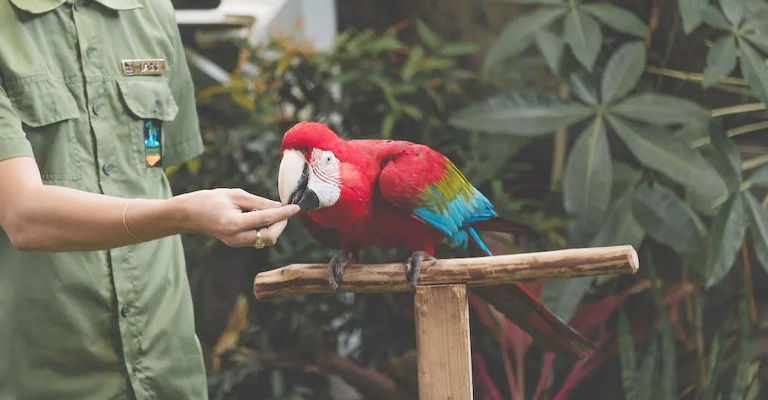
Feeding birds can contribute to the preservation of avian species, especially in urban areas where habitats are increasingly scarce. By providing food, individuals indirectly support local bird populations and create pockets of biodiversity.
Educational Opportunities
Feeding pigeons and other birds can serve as a valuable educational tool, especially for children. It offers a chance to learn about different bird species, their behaviors, and their role in the ecosystem.
Connecting Generations
This age-old practice often serves as a bridge between generations, as stories and experiences related to feeding birds are passed down from grandparents to parents and children. It fosters intergenerational bonding and shared memories.
Harmony with Nature
For some, feeding birds is a way of finding harmony within the urban landscape. It’s a small gesture that brings a touch of nature to city life, creating a sense of coexistence between humans and the avian world.
Cultural and Spiritual Significance
In certain cultures and spiritual traditions, feeding birds holds special significance. It’s seen as an offering or an act of reverence that connects individuals to broader spiritual beliefs.
Photographic Opportunities
Bird enthusiasts and photographers are often drawn to feeding areas to capture captivating moments of birds in their natural environment. This allows them to document the diverse behaviors, colors, and species of birds.
Therapeutic Value
Interacting with birds and engaging in activities like feeding them can have therapeutic effects. The calm and repetitive nature of the practice can help reduce stress and promote relaxation.
Cultural Traditions and Superstitions
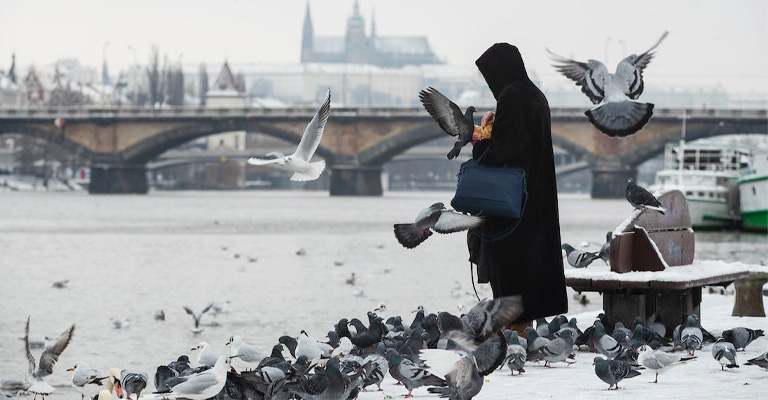
In certain cultures, feeding pigeons or specific birds is associated with luck, blessings, or protection. People may engage in this practice as part of cultural traditions or due to superstitions.
Environmental Awareness
Feeding birds can serve as a subtle reminder of the importance of environmental conservation. It prompts individuals to consider the impact of urbanization on bird habitats and encourages them to take proactive steps toward preserving nature.
Community Building
Bird feeding spots can become community gathering points, where people from diverse backgrounds come together to share their love for birds. This fosters a sense of community and encourages interactions among neighbors.
Appreciation for Beauty
Birds are often admired for their vibrant plumage and graceful movements. Feeding them provides an opportunity for people to observe these beautiful creatures up close and appreciate the natural world’s aesthetic appeal.
Research and Observation
Scientists, researchers, and bird enthusiasts may engage in feeding birds as a way to observe their behavior, migratory patterns, and population dynamics. This information contributes to scientific knowledge and conservation efforts.
In essence, feeding pigeons and other birds isn’t just about providing sustenance; it’s about forging connections between humans and the natural world, instilling values of empathy and wonder, and perpetuating traditions that celebrate the beauty of life in all its forms.
What Are the Benefits of Feeding Pigeons?
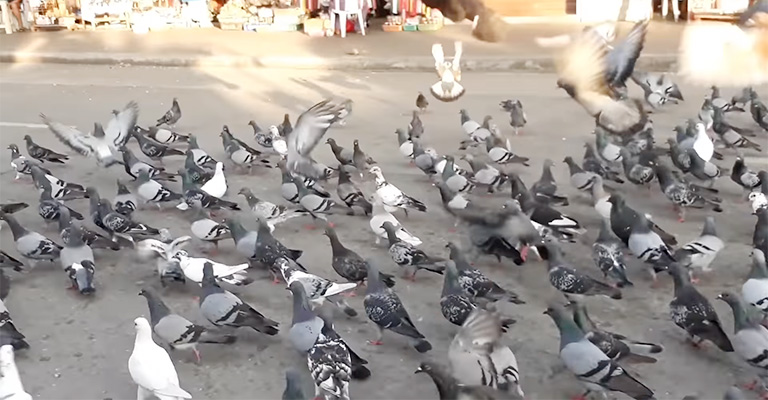
Feeding pigeons can have a few potential benefits. Here are a few:
Enjoyment and Relaxation
Feeding pigeons can be a calming and enjoyable activity for many people. It can provide a sense of connection with nature and bring a sense of peace and tranquility.
Educational Opportunities
Observing pigeons up close while feeding them can offer educational opportunities, especially for children. It can help them learn about different bird species, their behavior, and their natural habitat.
Community Bonding
Feeding pigeons in public spaces can bring people together and foster a sense of community. It can create opportunities for social interaction and conversation among individuals who share a common interest in birds.
Environmental Awareness
By feeding pigeons, people can develop a greater appreciation for the natural environment and the importance of preserving it. It can raise awareness about the needs of birds and other wildlife in urban areas.
However, it’s important to note that there are also potential drawbacks to feeding pigeons. Overfeeding can lead to an overpopulation of pigeons, which can cause issues such as excessive droppings, damage to property, and the spread of diseases.
Is Feeding Birds Bad for the Ecosystem?
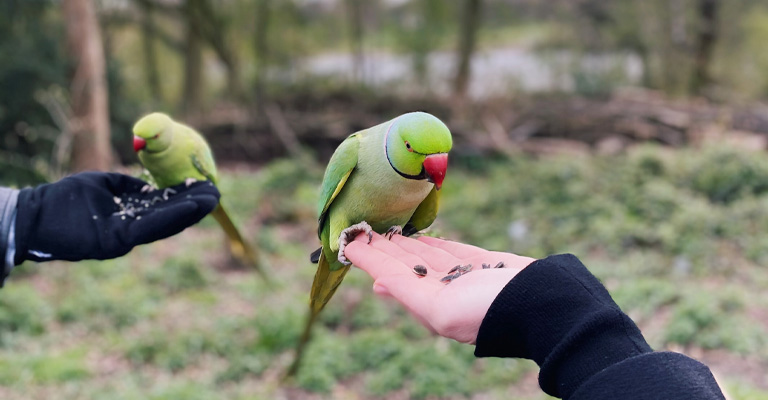
Feeding birds, including pigeons, can have both positive and negative impacts on the ecosystem. Here are some factors to consider:
Conservation Awareness
Feeding birds can raise awareness about the importance of preserving natural habitats and protecting bird populations.
Consistent monitoring of bird populations at feeding sites can help track changes in species abundance over time. Increases or decreases in certain species can indicate shifts in local ecosystems or potential environmental pressures.
Supplemental Food During Scarcity
In certain situations, such as during harsh winters or periods of food scarcity, providing supplemental food can help birds survive when their natural food sources are limited.
Research and Monitoring
Bird feeding can provide opportunities for researchers and bird enthusiasts to observe and study bird behavior, migration patterns, and population dynamics.
Bird feeding can attract a variety of bird species, including migratory ones. By monitoring the presence of different species throughout the year, researchers can gain insights into migration timing, routes, and stopover points.
Overpopulation
Excessive and unregulated feeding can lead to an overpopulation of certain bird species, including pigeons. This can disrupt the natural balance of ecosystems and cause issues such as increased competition for resources and the spread of diseases.
Dependency
Birds that become reliant on human-provided food may become less adept at finding natural food sources, which can negatively impact their foraging skills and survival abilities.
Disease Transmission
When birds congregate in large numbers around feeding areas, there is an increased risk of disease transmission among them. This can lead to the spread of avian diseases, which can have detrimental effects on bird populations.
To minimize potential negative impacts, it is important to feed birds responsibly. This includes providing a balanced diet, avoiding overfeeding, and maintaining cleanliness around feeding areas to reduce the risk of disease transmission.
Additionally, it is advisable to follow local regulations and guidelines regarding bird feeding to ensure that it is done in a way that is beneficial for both the birds and the ecosystem.
FAQs
Yes, feeding pigeons without regulation or moderation can contribute to an overpopulation problem.
Pigeons are prolific breeders, and an abundant food source can lead to rapid population growth, which can have negative consequences for the ecosystem and urban environments.
Feeding pigeons can pose health risks, primarily due to the potential spread of diseases. Pigeon droppings can harbor bacteria, fungi, and parasites that can be harmful to humans, especially if proper hygiene practices are not followed.
Yes, feeding pigeons can attract other pests such as rats, mice, and other birds. The presence of abundant food sources can create an environment that encourages the proliferation of these pests, which can lead to additional problems and potential health risks.
The legality of feeding pigeons can vary depending on local regulations and ordinances. Some cities or municipalities may have restrictions or bans on feeding pigeons or other wildlife to manage population control or prevent nuisance issues.
Absolutely! There are several alternative ways to appreciate birds without directly feeding them. You can create bird-friendly habitats in your backyard by planting native plants, providing birdhouses or nesting boxes, and maintaining a clean water source.
Wrapping Up!
As the sun sets and the day winds down, the echoes of birdsong often linger in the air, a reminder of the connections we share with the avian world.
Whether motivated by a love for nature, a wish to create moments of joy, or a simple appreciation for the beauty of flight, those who feed pigeons and other birds bring a touch of enchantment to the everyday.
As cities evolve and green spaces become more precious, this age-old tradition continues to bridge the gap between humans and the wild, fostering a sense of wonder that transcends the mundane.
So, the next time you catch sight of someone scattering breadcrumbs or pouring out seeds, remember that within this seemingly small act lies a profound connection to the rhythms of nature and the timeless allure of our feathered companions.